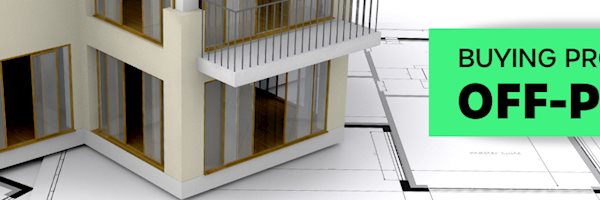Buying off-plan means you are purchasing a new home in a development that is either in the planning stages of being built, or is under construction. If you are contemplating buying off-plan, and unsure of whether this will be a good investment or a poor decision, consider the following pro’s and con’s.
Pro’s
Brand new property Having never been occupied, the allure of owning a brand new property is one of the most appealing aspects of an off-plan purchase. This exclusivity adds significant value to the property making it more desirable for tenants, if you wish to rent it out, and to future buyers.
New developments are usually designed and constructed to the latest trends, meaning your off-plan purchase will likely come with modern features catering to the preferences of a wide range of buyers. And, in many such developments, you may have the option to choose from a number of different fixtures and fittings.
The brand new home is an opportunity for growing families, first-time buyers, and investors who are looking for a home that has a fresh and exciting aesthetic.
Savings
One of the major advantages of buying off-plan properties is the flexibility of payment and a number of savings. For a start there are no transfer duties, and Value Added Tax (VAT) is included in the purchase price.
Unlike ready-to-move-in properties that generally require a full payment either through a cash deal or through a home loan, some developers also offer a payment plan while the property is under construction. This flexibility, plus a potential offering by the developer to pay for registration costs and transfer legal fees, is a great incentive, and more so when you consider that buying off-plan can often be more affordable than the purchase of an existing property.
Even better is that until construction is complete, bond repayments are delayed giving the purchaser time to revise budgets. And, while you wait, a property that is under construction can actually grow in value as the building progresses.
You will also realise unseen savings because repairs and maintenance are usually guaranteed by the developer for a specified period of time. Where such problems may be encountered and if the developer refuses to attend to those problems as per the contract, the buyer still has recourse through the National Home Builders Registration Council (f the developer is registered) and is also protected by the Consumer Protection Act (CPA), which does not apply to a private seller.
A deposit of 10% is usually required, and bearing in mind that a construction can take anywhere from 18-24 months, you’ll have plenty of time to negotiate with a home loan provider for the best rate of interest and repayment plan.
Capital appreciation
The potential for capital appreciation is heightened if the property is still in the development stage when you make the purchase, because you are securing it at the current marketplace price. This could be a negative though if interest rates come down or the market swings negatively. But, as earlier indicated, as construction progresses, the property value is likely to increase anyway..
Real estate is considered a good hedge against inflation and interest rates, so buying off-plan means you are locking in the cost of the property at today’s value for its value in the future. Bear in mind that inflation and interest rates also have cost implications for building, materials and labour that may have an impact on the cost of purchase at a later date.
The earlier you get your foot in the door, the more likely you are to realise a long-term investment benefit, with the potential future value reaching up to 20% or more.
Cons
Okay, so everything sounds good so far, but it is essential to be aware of some of the pitfalls.
Uncertainty about the final construction
Developers usually provide beautifully designed brochures and artistic renderings to showcase how the property will look when constructed. There is, however, no guaranteed that the actual property when finished, will be a precise representation of the images you have seen, and this may sometimes not be the fault of the developer.
Changes in architectural design can happen as building commences. Promised fixtures and fittings may no longer be available or unaffordable requiring the developer to make adjustments. The developer should communicate and address these scenarios with buyers.
Developer could go out of business
While off-plan buyers are well-protected by their home-loan financier, it may still happen that a developer goes bankrupt before delivering the property to buyers. In such a case the deposit can be claimed back with interest because the law requires developers to keep deposits in a trust account for safekeeping.
Price negotiations are constrained
Off-plan buyers often have less room for negotiating prices because developers have already factored in discounts. They will also have addressed the initial pricing of off-plan properties to attract early buyers and create a sense of urgency around the purchase offering. They are, therefore, less inclined to negotiate further, especially at the early stages of selling, when they anticipate having many enquiries.
If a development project is also being built in phases, prices may rise for those phases to come, so a developer may be anticipating future higher prices and therefore less flexible in the opening price.
Conclusion
Using off-plan can be rewarding but buyers should undertake their own research including exploring the reputation of the developer, examining the developer’s track record, the location and any other risks associated to the area and competing developments.
